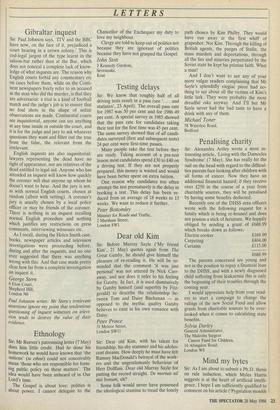LETTERS
Gibraltar inquest
Sir: Paul Johnson says, 'ITV and the BBC have now, on the face of it, prejudiced a court hearing in a crown colony.' This is cod-legal jargon of the type learnt in the saloon-bar rather than at the Bar, which does not conceal a complete lack of know- ledge of what inquests are. The reason why English courts forbid any commentary etc on cases before them, while on the Conti- nent newspapers freely refer to an accused as the man who did the murder, is that they are adversarial: a trial is a kind of football match and the judge's job is to ensure that no foul shots in the shape of unfair observations are made. Continental courts are inquisitorial, anyone can say anything at any time inside or outside the court, and it is for the judge and jury to ask whatever questions they want and filter out the true from the false, the relevant from the irrelevant.
English inquests are also inquisitorial: lawyers representing the dead have no right of appearance, nor are relatives of the dead entitled to legal aid. Anyone who has attended an inquest will know how quickly the coroner will shut anyone up whom he doesn't want to hear. And the jury is not, as with normal English courts, chosen at random (albeit with vetting). A coroner's jury is usually chosen by a local police officer or may be friends of the coroner. There is nothing in an inquest recalling normal English procedure and nothing which justifies any restrictions on press comments, interviewing witnesses etc.
As I recall, during the Helen Smith case, books, newspaper articles and television investigations were proceeding before, during and after the inquests, and no one ever suggested that there was anything wrong with this. And that case made pretty clear how far from a complete investigation an inquest it.
George Stern 6 Eton Court, Shepherd Hill, London N6 Paul Johnson writes: Mr Stern's irrelevant assertions ignore my point that tendentious questioning of inquest witnesses on televi- sion tends to destroy the value of their evidence.


















































 Previous page
Previous page